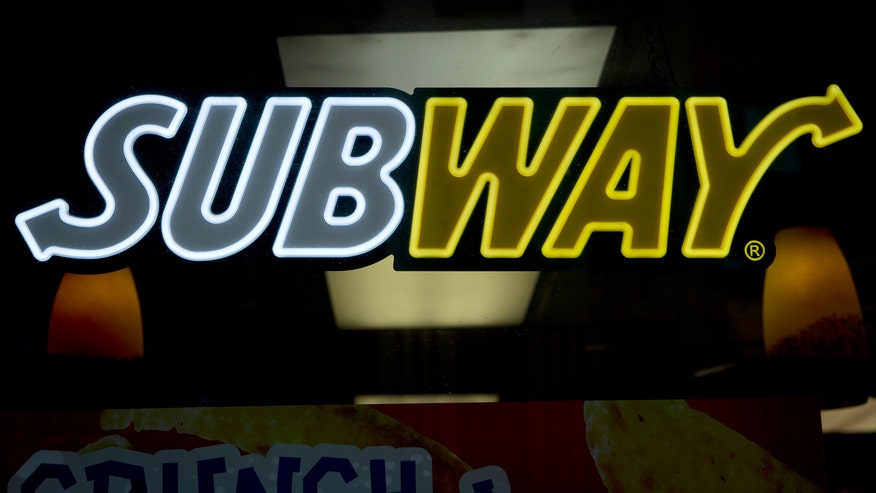
A Subway sandwich shop logo is pictured in the Manhattan borough of New York February 14, 2014. (REUTERS/Carlo Allegri)
Last week, Subway, the nationwide chain of sandwich shops, announced it would remove from its baked breads a possible carcinogen also found in yoga mats and the rubber soles of shoes. They are not doing this out of the goodness of their corporate hearts, however, but instead in response to an extended campaign by blogger Vani Hari, the founder of FoodBabe.com.
While it is good news that Subway has agreed (under pressure) to remove azodicarbonamide from its baked breads, it’s not great that it comes only at the behest of a grassroots effort. As Hari has noted, Subway does not use this chemical additive in its Australian and European stores because it is banned on those continents.
I’m not surprised that the U.S. Food and Drug Administration allows a chemical that has been linked to cancer, asthma and skin problems to pervade this country’s food supply. You’re probably not surprised either. Every few weeks, we discover that some toxic element exists in our food or water, and that the government is doing very little to prevent, regulate or improve the situation.
As I’ve written in this column, there’s arsenic in rice, fungicide in orange juice and medications in tap water. While the government spends a ridiculous sum of money to protect us from foreign dangers, what about those we are regularly, and often unknowingly, putting inside our bodies?
Subway is not alone in using azodicarbonamide to strengthen its dough. According to NaturalNews.com, chains like Arby’s, McDonalds, and Starbucks also use it in certain baked goods. As the Center for Science in the Public Interest observed in its statement on the matter, many types of bread are baked without using this questionable substance. Why can’t they all be?
Aside from several suspected health risks, another problem of using such chemicals in mass-produced foods is that when people get used to their food looking or tasting a certain way, they like it; not necessarily because it tastes better, but because it is familiar. Sodium nitrite is used to preserve lunch meats so that they don’t appear gray, and therefore unappetizing, even though nitrites have been linked to health problems like stomach cancer.
But people want their meat to look pretty, and they want their Subway sandwich dough to smell, look and taste a certain way, too. We are creatures of habit, but when such habits threaten our health, we need to seriously reevaluate our priorities, and the message we send when we settle for chemical-ridden foods.
It’s great that concerned citizens like Vani Hari of Foodbabe.com – and the 57,000-plus people who signed her petition – forced Subway’s hand, and that last year Hari was also able to convince Kraft to replace the yellow food dye in its famous Mac & Cheese with a natural alternative. But Hari is just one person. She shouldn’t have to make up for our federal government continually dropping the ball.
Food preservatives, artificial dyes and other toxic chemicals pervade our food supply, even though the potentially devastating effects of such substances are well-documented. For some reason, other countries are much more proactive at protecting citizens from such dangers. I don’t know about you, but I’m tired of hearing about our delayed response to these issues. Until the FDA forces food manufacturers and purveyors to remove carcinogens from their products, little is going to change. Companies like Subway ought not be applauded when they cave, but rather when they lead.
Note: Information provided herein is not intended to treat or diagnose any health condition. As always, consult your healthcare provider with any questions or health concerns.
Deirdre Imus, Founder of the site devoted to environmental health, www.ImusEnvironmentalHealth.org, is President and Founder of The Deirdre Imus Environmental Health Center® at Hackensack University Medical Center and Co-Founder/Co-Director of the Imus Cattle Ranch for Kids with Cancer. She is a New York Times best-selling author and a frequent contributor to FoxNewsHealth.com, and Fox Business Channel. Check out her website at www.ImusEnvironmentalHealth.org and ‘Like’ her Facebook page here.

